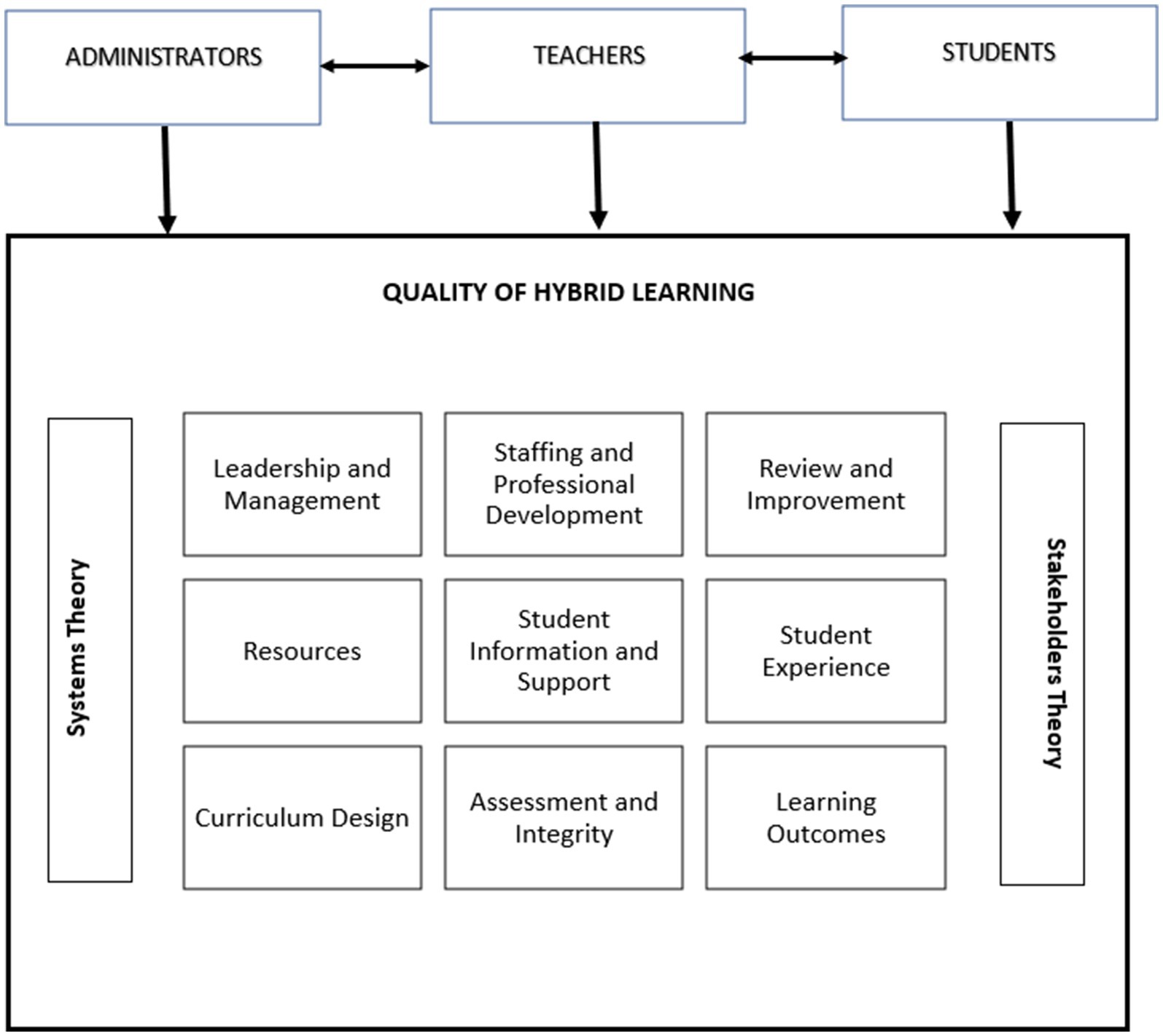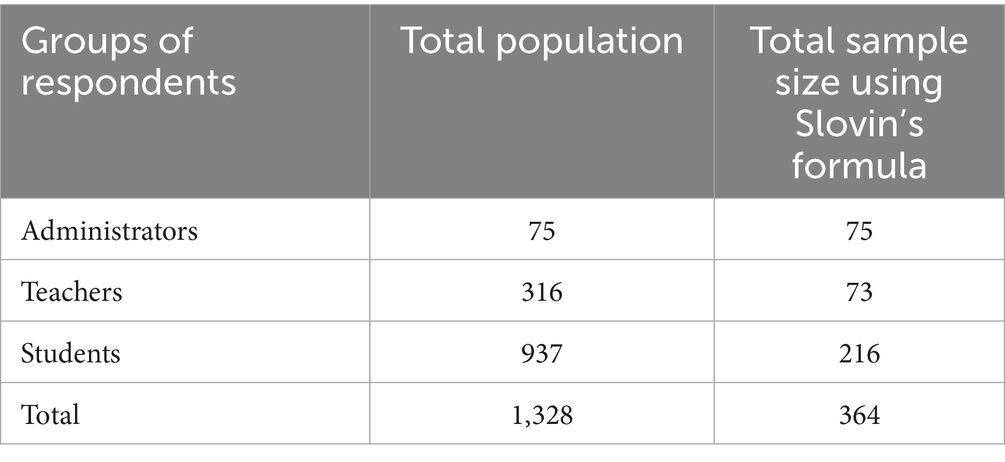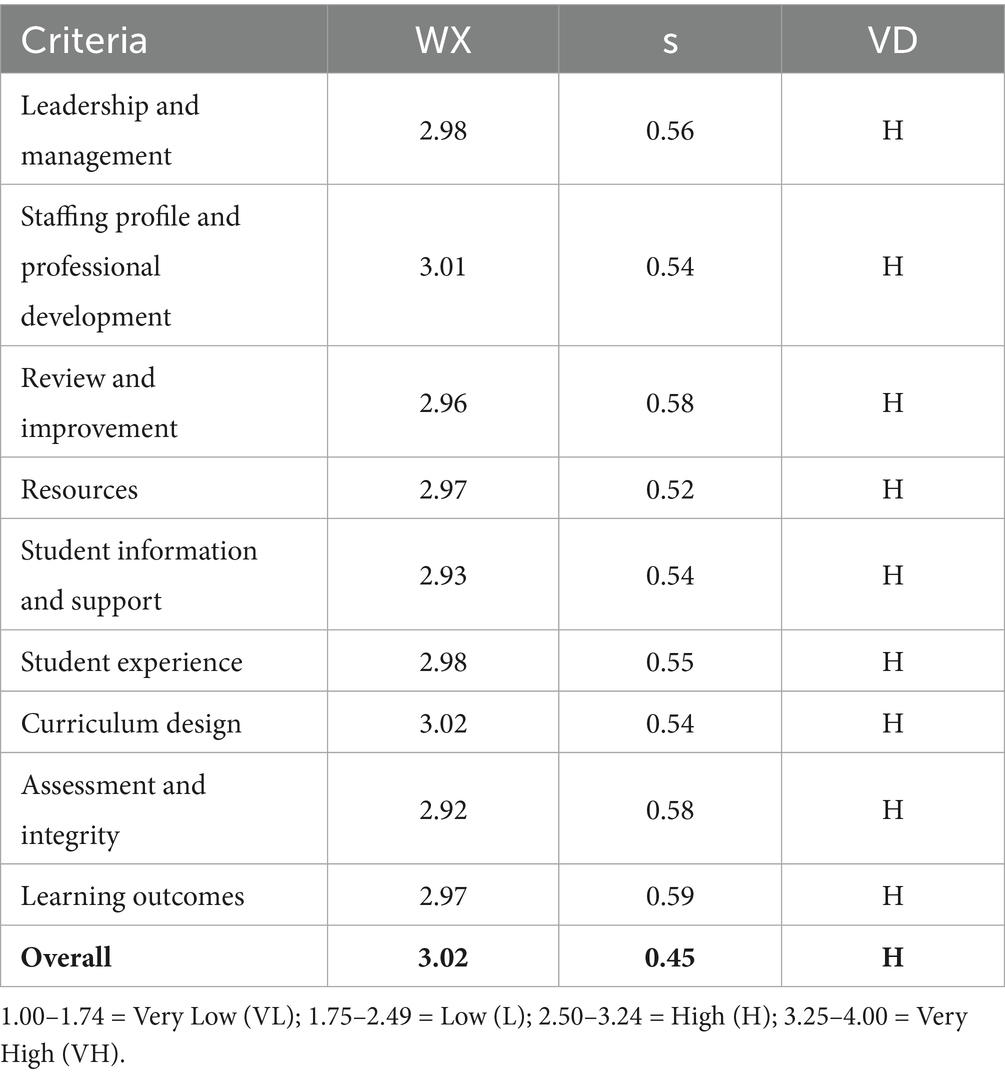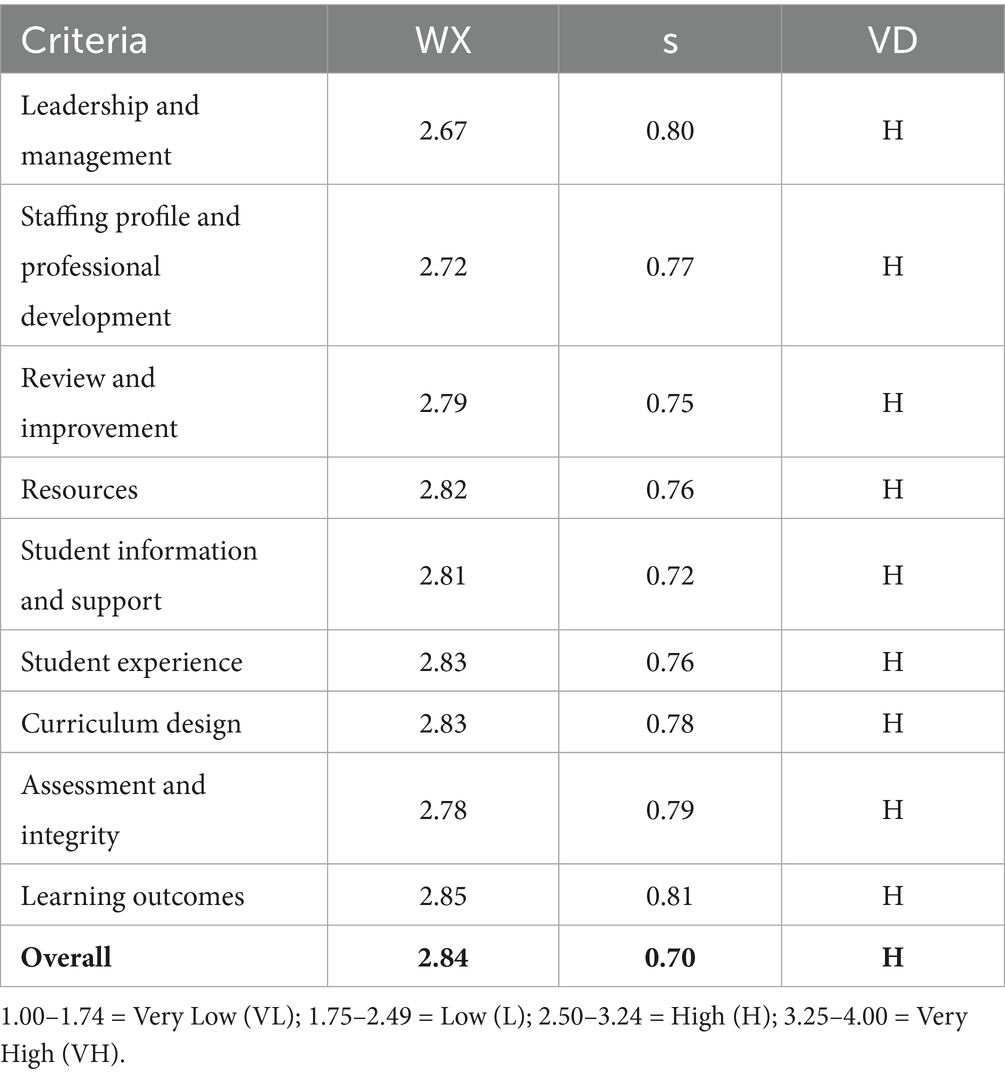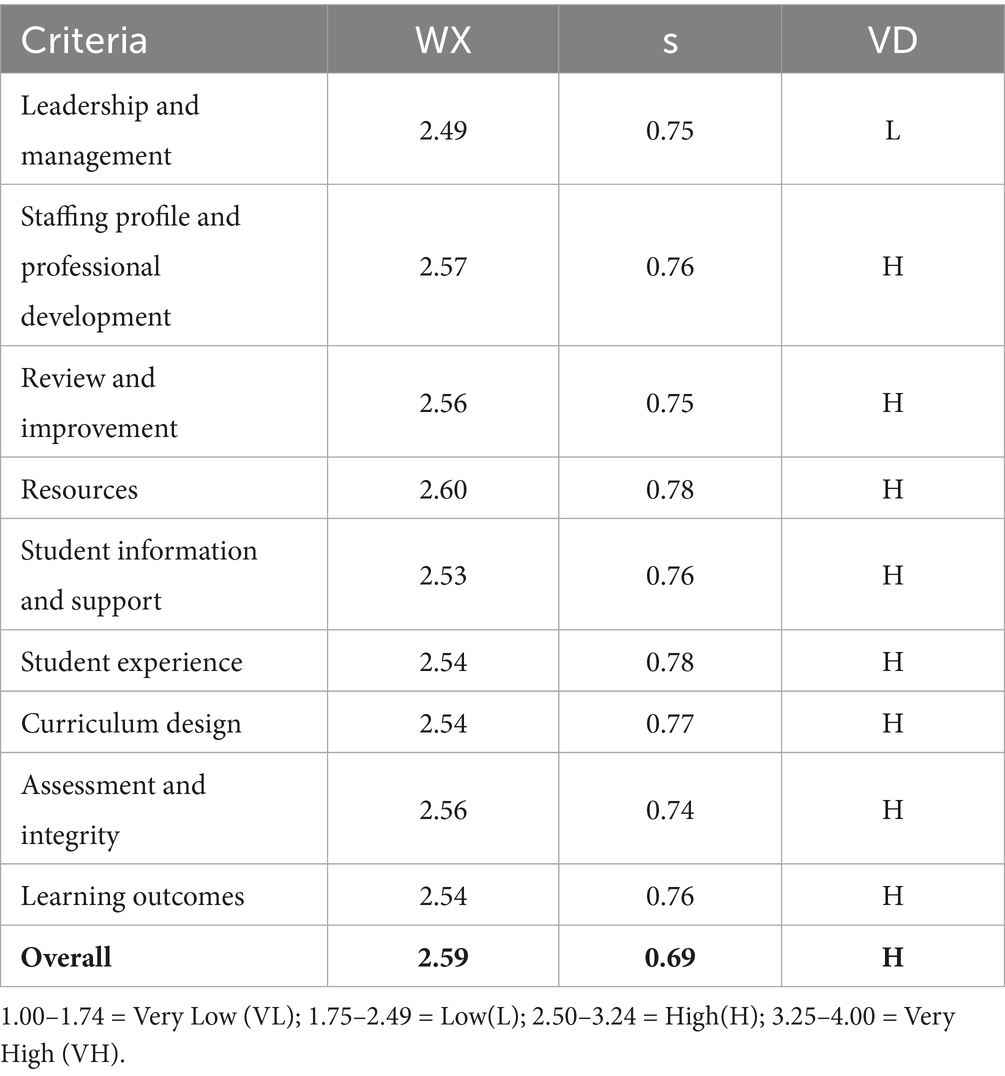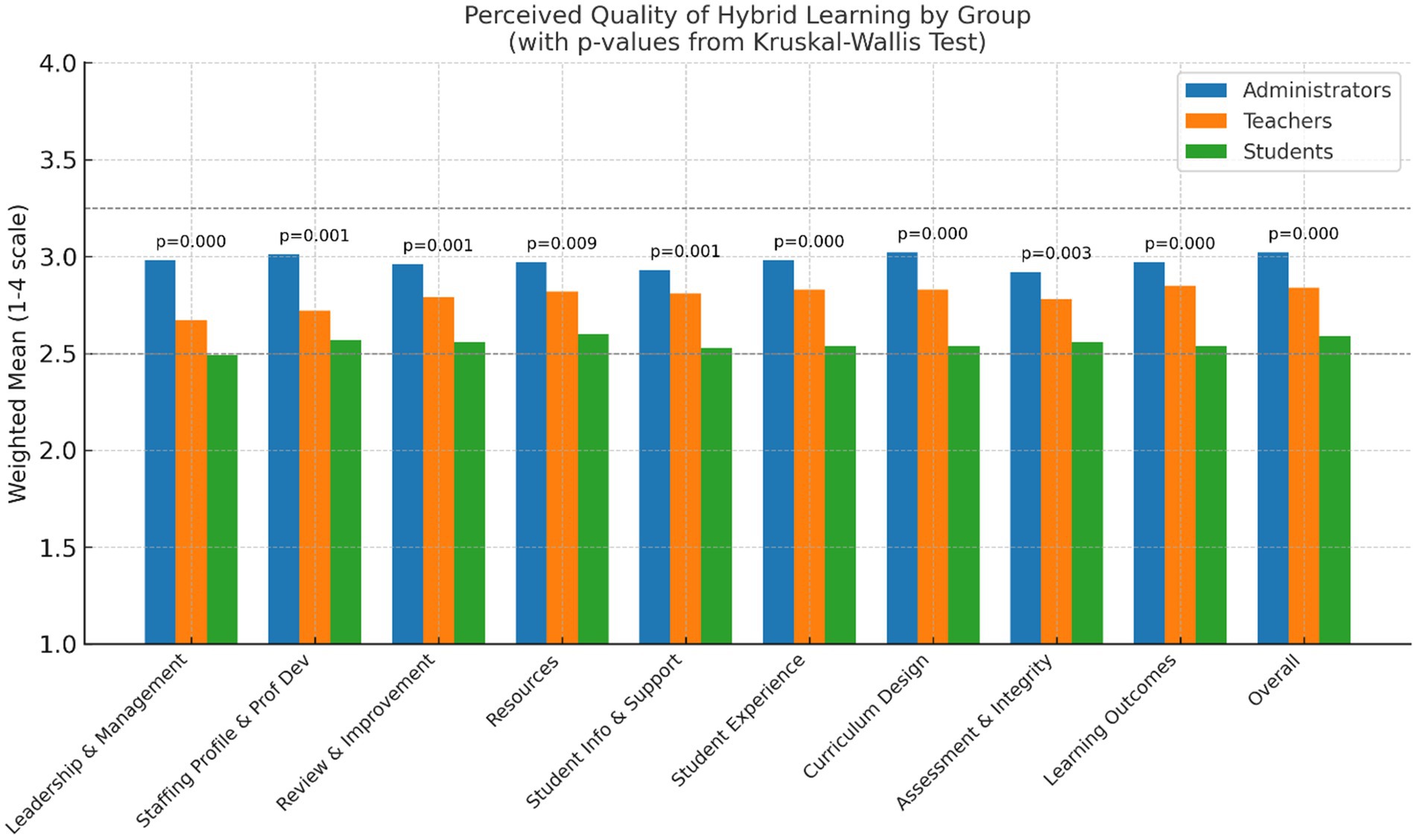- 1Education Quality Center, Southwest Medical University, Luzhou, Sichuan, China
- 2Dr. Mariano C. Lao Global Studies Center, Silliman University, Dumaguete, Philippines
In the contemporary era of rapid technological advancements, hybrid learning has become a significant educational model, particularly in higher education institutions. This study investigates how administrators, teachers, and students in a Chinese university evaluate hybrid learning across nine domains: leadership and management, staffing profile and professional development, review and improvement, resources, student information and support, student experience, curriculum design, assessment and integrity, and learning outcomes. A cross-sectional survey was administered online to 341 respondents (60 administrators, 70 teachers, and 211 students). Descriptive statistics summarized ratings, while the Kruskal–Wallis test examined group differences. Findings show administrators rated hybrid learning most favorably (mean = 3.02), followed by teachers (mean = 2.84) and students (mean = 2.59) on a 4-point scale. Significant differences (p < 0.05) emerged across all domains. Significant differences were observed among the groups, particularly in technological competency, institutional readiness, and hybrid learning quality, with students indicating lower satisfaction in leadership (mean score of 2.49) and staffing (mean score of 2.57). Despite these discrepancies, most respondents rated hybrid learning as high across the majority of domains. The study concludes that, while hybrid learning at the university meets essential quality indicators, further enhancements are necessary to address disparities and optimize overall learning outcomes.
Introduction
The rapid advancement of science and technology has ushered society into the information age, profoundly transforming everyday life and reshaping educational paradigms. Integrating information technology into education has enabled the development of networked, digital, and lifelong learning systems—fostering knowledge societies and supporting the cultivation of innovative learners. Among the three primary modes of knowledge acquisition—classroom instruction, online learning, and self-study—the Internet has emerged as a significant medium for higher education students (Liu, 2013). Online learning, in particular, offers flexibility, interactivity, and access to diverse resources, making it a powerful complement to traditional instruction (Wang, 2020). While multiple modalities such as e-learning, blended, and hybrid models have been adopted, the physical classroom remains pedagogically valuable. Hybrid learning, which integrates face-to-face and online instruction, extends traditional classroom practice by creating more inclusive and dynamic learning experiences (King and Arnold, 2012). Hybrid learning supports differentiated instruction and encourages student autonomy, critical thinking, and engagement (Xiao, 2016). By offering flexible, self-paced environments, it enables learners to manage their own progress more effectively. The COVID-19 pandemic accelerated the adoption of hybrid modalities, disrupting conventional teaching and prompting a global reassessment of how to evaluate and sustain quality in hybrid learning systems (UNESCO IBE, 2023).
Despite its growing adoption, the evaluation of hybrid learning quality remains underdeveloped. Educational quality is often measured by learning outcomes and student achievement (International Institute for Educational Planning-UNESCO, 2011). However, the evaluation of hybrid learning quality remains underdeveloped. Debates persist regarding how to assess online learning, which differs fundamentally from face-to-face instruction. Since hybrid learning incorporates both online and offline components, its evaluation must consider the distinct contributions of each. The Higher Education Accreditation Council has highlighted the importance of reliable and valid performance metrics for assessing quality in online education (Weiger, 1998). Effective quality assurance in hybrid learning requires well-defined indicators. Learning effectiveness is multidimensional and should be evaluated using a range of quantitative and qualitative measures. Prior studies have assessed distance learning quality through student outcomes (Ni, 2013; Costreie, 2011) and institutional staff perceptions (Yeung, 2001). To maximize the potential of hybrid learning and support pedagogical innovation, institutions must adopt rigorous and context-sensitive evaluation frameworks. In response, the Asia-Pacific Economic Cooperation (2017) developed a “Quality Assurance of Online Learning Toolkit,” outlining nine domains for evaluating hybrid learning: (1) leadership and management, (2) staffing and professional development, (3) review and improvement, (4) resources, (5) student information and support, (6) student experience, (7) curriculum design, (8) assessment and integrity, and (9) learning outcomes. These domains capture both operational and pedagogical dimensions of hybrid learning and provide a structured foundation for institutional evaluation.
In China, hybrid learning has gained national attention, particularly following the release of the National Medium- and Long-Term Educational Reform and Development Plan (2010–2020) (Ministry of Education of the People’s Republic of China, 2010). Government policy has promoted deeper integration of information technology in higher education. Nevertheless, most studies in the Chinese context rely on teacher-led investigations, which may introduce bias and fail to capture the perspectives of other stakeholders. As a result, key factors influencing hybrid learning quality remain underexplored, and existing evaluation models lack generalizability.
This study addresses these gaps by evaluating the perceived quality of hybrid learning from the perspectives of three key stakeholder groups: administrators, teachers, and students. As primary actors in the hybrid learning ecosystem, their views provide critical insight into institutional readiness, instructional practice, and learner experience. Specifically, the study explores the following research questions: (1) How do administrators, teachers, and students perceive the quality of hybrid learning? (2) Are there significant differences among these groups in the quality of hybrid learning? This study adopts the Asia-Pacific Economic Cooperation (APEC) framework as its evaluation benchmark and situates the analysis within the Chinese higher education context. In this study, hybrid learning in higher education is defined as the deliberate integration of on-campus and online learning experiences, supported by institutional strategies, digital infrastructure, and pedagogical innovations. Within the context of the participating Chinese university, hybrid learning has been positioned as a pathway toward more flexible, resilient, and inclusive education in line with national modernization goals. However, questions remain regarding how its quality is perceived across different stakeholder groups—particularly administrators, teachers, and students—who engage with the system from diverse perspectives and roles. This study therefore examines and compares these perceptions across nine domains of hybrid learning quality, identifying statistically significant differences and exploring their implications for practice. Addressing these differences is critical for sustaining quality and equity in hybrid delivery; potential solutions include strengthening leadership and management mechanisms, ensuring targeted professional development, enhancing transparency in quality assurance processes, and improving access to student support services. Section 1 introduces the study, while Section 2 reviews related literature. Section 3 outlines the research methodology, Section 4 presents and interprets the results, and Section 5 concludes with recommendations for institutional policy and practice.
Literature review
Hybrid learning in higher education
Hybrid learning—combining face-to-face and online instruction—has gained global traction as a flexible model for delivering quality education in the digital era (Zhao and Yuan, 2010). In higher education, it offers adaptability, resource optimization, and the potential for more personalized learning experiences (Amaechi et al., 2022a; Amaechi et al., 2022b; Zhao and Yuan, 2010). The COVID-19 pandemic accelerated its adoption worldwide, prompting educators to explore models that ensure continuity while addressing diverse learner needs (Li et al., 2017).
In the Asia-Pacific region, hybrid learning has been implemented with varying degrees of institutional preparedness, influenced by technological infrastructure, faculty readiness, and policy support (Amaechi et al., 2022a; Amaechi et al., 2022b; Wang et al., 2015). Studies in multiple contexts have highlighted the importance of aligning institutional strategy with pedagogical design, integrating student support systems, and ensuring quality through regular review (Amaechi et al., 2022a; Amaechi et al., 2022b).
Lessons from Chinese higher education
China’s approach to hybrid learning emphasizes the integration of “Internet+” platforms for centralized resource management, large-scale teacher training combining pedagogy and platform-specific skills, and the use of data analytics to monitor engagement and academic integrity. National strategies align hybrid learning initiatives with long-term educational reforms, ensuring policy coherence and sustainability (Li et al., 2017). These experiences provide valuable insights for institutions seeking to implement hybrid models at scale.
Comparative insights and research gaps
Existing literature reveals three main gaps
First, much of the research evaluates hybrid learning from the teacher’s perspective alone, limiting insights into student and administrator experiences. Second, while studies describe institutional readiness and platform adoption, few apply a structured, multi-domain quality framework to evaluate hybrid learning in a Chinese university context. Third, cross-comparative analyses between hybrid learning and other teaching models are often limited to broad effectiveness claims rather than specific quality domains.
Addressing these gaps, this study evaluates hybrid learning quality at Southwest Medical University using the Asia-Pacific Economic Cooperation (APEC) Quality Assurance of Online Learning Toolkit (Asia-Pacific Economic Cooperation, 2017). It incorporates administrator, teacher, and student perspectives, providing a multi-stakeholder view that is less common in existing research.
Summary of related studies
Table 1 consolidates findings from selected global and Chinese studies on hybrid learning in higher education. It integrates methodologies, key parameters, comparative aspects with other teaching models, and documented benefits. This synthesis positions the present study within the broader discourse and highlights how its multi-stakeholder, framework-based evaluation contributes a distinct perspective.
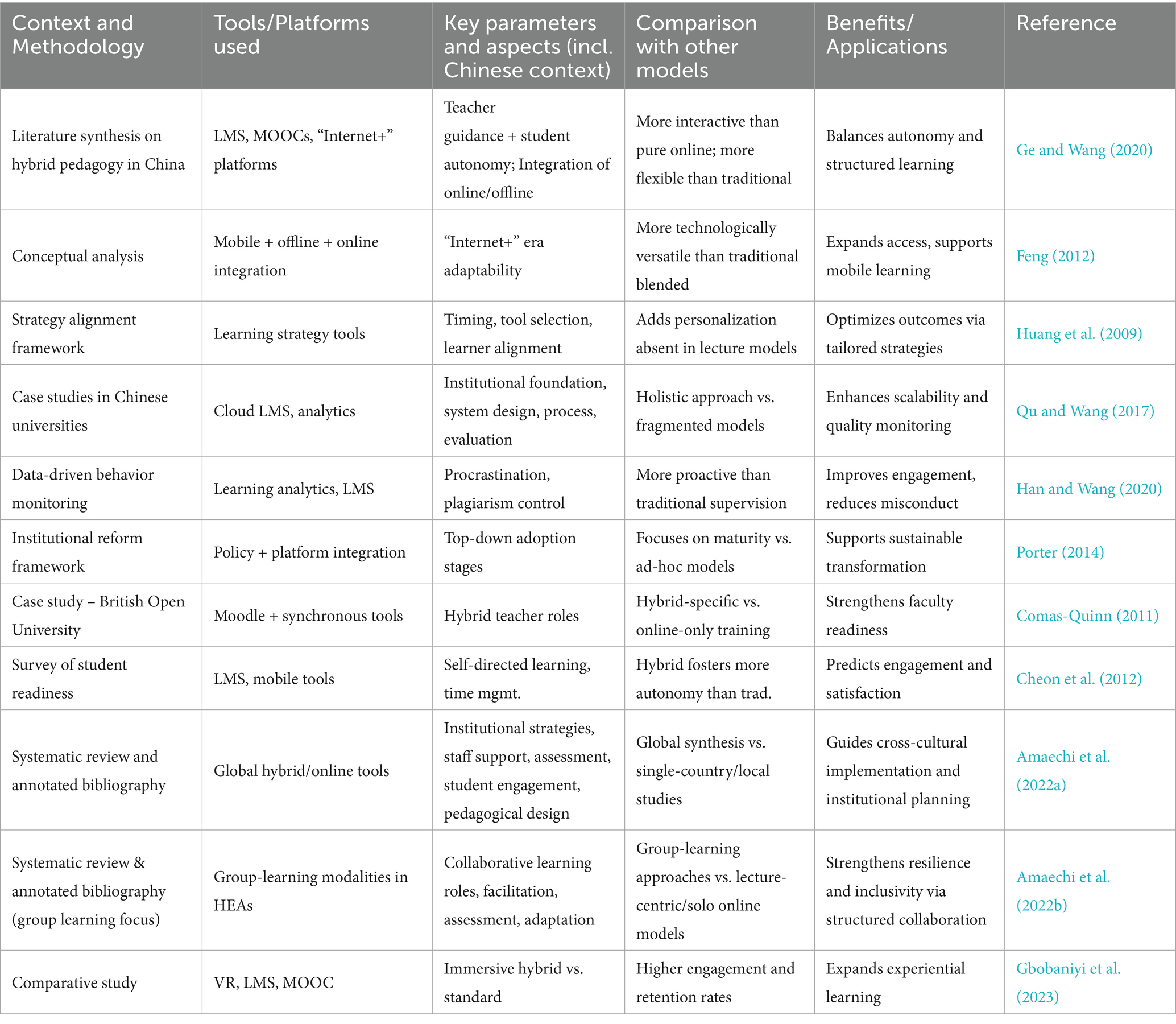
Table 1. Summary of selected studies, key parameters, comparisons, and benefits of hybrid learning in higher education.
Theoretical framework
This study is grounded in the Asia-Pacific Economic Cooperation (APEC) Quality Assurance of Online Learning Toolkit (Asia-Pacific Economic Cooperation, 2017), which offers a comprehensive framework for evaluating hybrid learning across nine domains: leadership and management, staffing and professional development, review and improvement, resources, student information and support, student experience, curriculum design, assessment and integrity, and learning outcomes. These domains encompass the operational, pedagogical, and experiential dimensions essential to assessing hybrid learning quality (Figure 1).
Two complementary theories strengthen the conceptual foundation. Systems Theory views hybrid learning as an interconnected system in which institutional policies, teaching strategies, technological infrastructure, and learner engagement interact dynamically to influence outcomes (von Bertalanffy, 1968). Stakeholder Theory emphasizes integrating the perspectives of administrators, teachers, and students—the primary actors whose experiences and perceptions shape and reflect the overall quality of hybrid delivery (2010). Together, these frameworks guide both the evaluation design and interpretation of findings in this study.
Methods
This study employed a descriptive-comparative research design to assess the perceived quality of hybrid learning among key stakeholders. The research was conducted at Southwest Medical University, a comprehensive higher education institution located in Sichuan Province, China. Established in 1951, the university employs 1,328 full-time faculty members and serves over 20,000 students, including undergraduates, postgraduates, and international learners. The institution offers a wide array of academic disciplines, with particular strengths in medicine, management, law, and education. It places a strong emphasis on educational quality assurance and has established a dedicated teaching evaluation center to support continuous instructional improvement.
The study involved three respondent groups: administrators, teachers, and students. Slovin’s formula was used to determine the appropriate sample sizes for the teacher and student groups, while a complete enumeration was applied for the administrator group due to its smaller population. To ensure representativeness across stakeholder groups, stratified random sampling was employed. The inclusion criteria were as follows: administrators were selected from departments directly involved in the implementation of hybrid learning; teachers were those actively teaching in departments that had adopted hybrid learning as a regular instructional approach; and students were drawn from fourth-year programs within these departments, as first- and third-year students typically have limited exposure to hybrid learning, and fifth-year students are generally engaged in internships. See Table 2 for the distribution of the samples.
Data were collected using a structured survey questionnaire administered via the Questionnaire Star online platform. The instrument comprised a preface and four main sections, covering nine domains of hybrid learning quality as outlined by Asia-Pacific Economic Cooperation (2017): (1) leadership and management, (2) staffing profile and professional development, (3) review and improvement, (4) resources, (5) student information and support, (6) student experience, (7) curriculum design, (8) assessment and integrity, and (9) learning outcomes. Responses were recorded using a Likert scale.
To validate the reliability of the instrument, a pilot test was conducted with a sample of 40 participants (10 administrators, 10 teachers, and 20 students). The instrument achieved a Cronbach’s alpha of 0.979, indicating excellent internal consistency and high reliability, making it suitable for further statistical analysis.
The research protocol adhered to ethical standards set by the Silliman University Research and Ethics Committee (UREC) and received formal approval from the Ethics Committee of Southwest Medical University (SWMU).
Results and discussion
Quality of hybrid learning
Table 3 presents the perceived quality of hybrid learning from the perspective of administrator-respondents. The overall weighted mean is 3.02, corresponding to the descriptor “High.” The standard deviation is below 1, indicating consistency in responses. Across the nine quality domains, weighted means range from 2.50 to 3.24—within the “High” category—including leadership and management, staffing profile and professional development, review and improvement, resources, student information and support, student experience, curriculum design, assessment and integrity, and learning outcomes.
Of particular note is the indicator “more developed review and development mechanism” under the domain of review and improvement, which scored a weighted mean of 3.85—categorized as “Very High.” All other indicators fall within the “High” range.
This finding suggests that administrators perceive hybrid learning to meet essential quality benchmarks, particularly in areas where institutional leadership and quality monitoring are prominent. Their elevated perspective may stem from their comprehensive understanding of institutional processes and systems. While the quality is generally high, further enhancement is necessary to reach optimal effectiveness and institutional maturity.
Table 4 summarizes teachers’ perceptions. The overall weighted mean is 2.84, also within the “High” category, with standard deviations below 1 indicating relative consensus. Each of the nine domains yielded scores between 2.67 and 2.85, consistently within the high range. This indicates that teachers regard hybrid learning as satisfactory, with room for improvement. Teachers’ proximity to the instructional process allows for nuanced insights, balancing their direct interaction with students and their professional development needs. As Wu (2023) suggests, teachers offer valuable feedback due to their dual role as implementers and observers of instructional quality, integrating both qualitative and quantitative perspectives in their evaluation.
Table 5 presents student-respondents’ ratings of hybrid learning. The overall weighted mean is 2.59, still within the “High” descriptor, but comparatively lower than those of administrators and teachers. Seven of the nine domains scored within the high range, while two domains—leadership and management (2.49) and staffing profile and professional development (2.57)—received lower scores, with leadership and management falling into the “Low” category.
Further analysis reveals that six specific indicators—related to online teaching staff, management bodies, module clarity, training, technical support teams, and student support mechanisms—were rated “Low” by students. These indicators span the domains of leadership and management, staffing and professional development, and student information and support.
These findings reflect perceived deficiencies in the institutional and instructional infrastructure supporting students in hybrid environments. Although students generally acknowledge the quality of the learning experience itself, they express concerns regarding the availability of support structures and the adequacy of instructional delivery. These concerns are consistent with existing literature emphasizing the importance of student readiness and support in hybrid contexts (So and Brush, 2008). Therefore, improvement plans should not be limited to administrative or teaching staff but should also directly engage students to enhance their hybrid learning experience.
The consolidated results, shown in Figure 2, 3, from administrators, teachers, and students indicate an overall “High” rating for hybrid learning quality across all groups. However, perceptual gaps exist, particularly in how students view institutional leadership and instructional support. These gaps warrant targeted interventions.
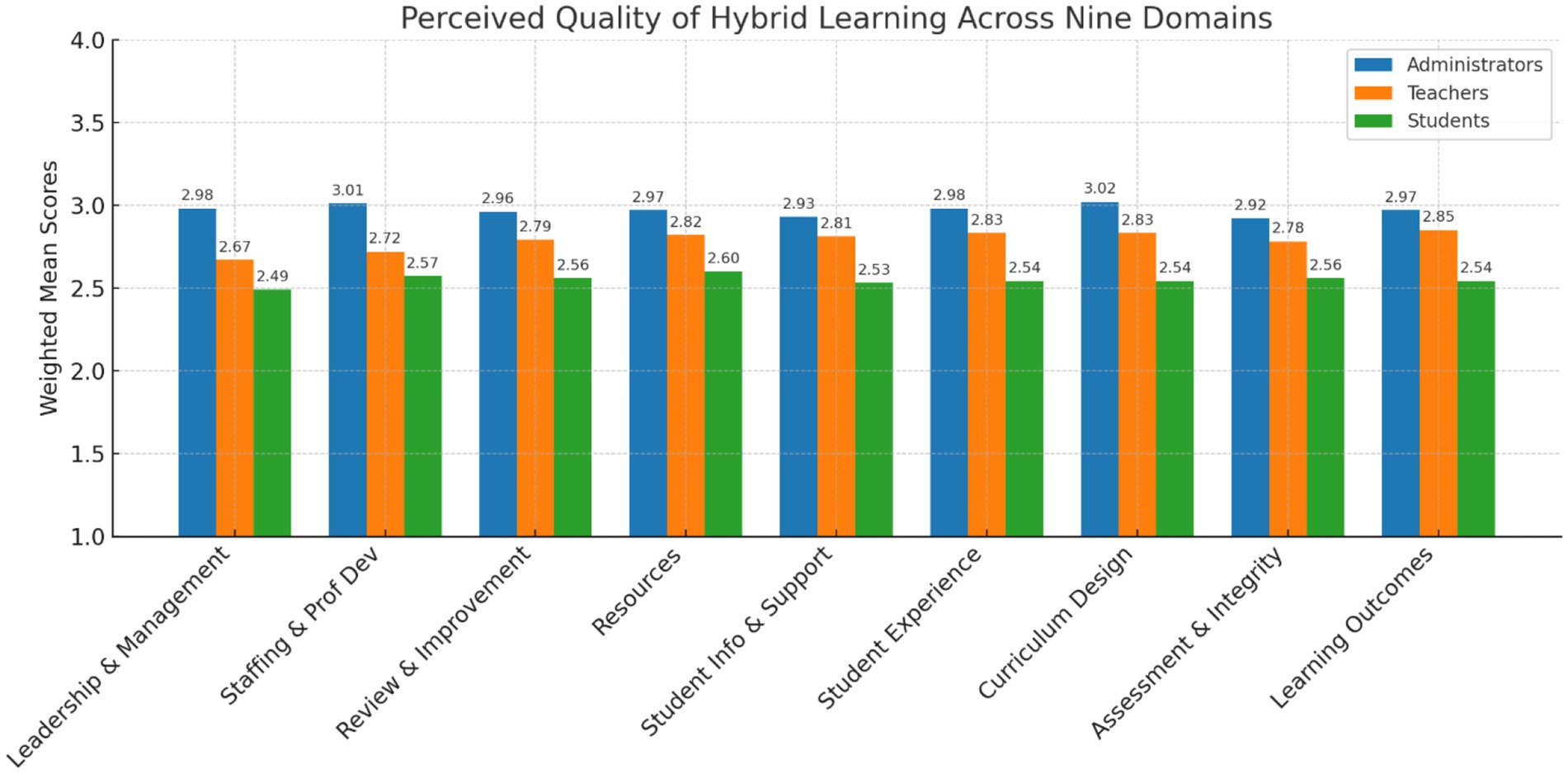
Figure 2. Bar chart of the weighted means for the perceived quality of hybrid learning across nine domains among administrators, teachers, and students.
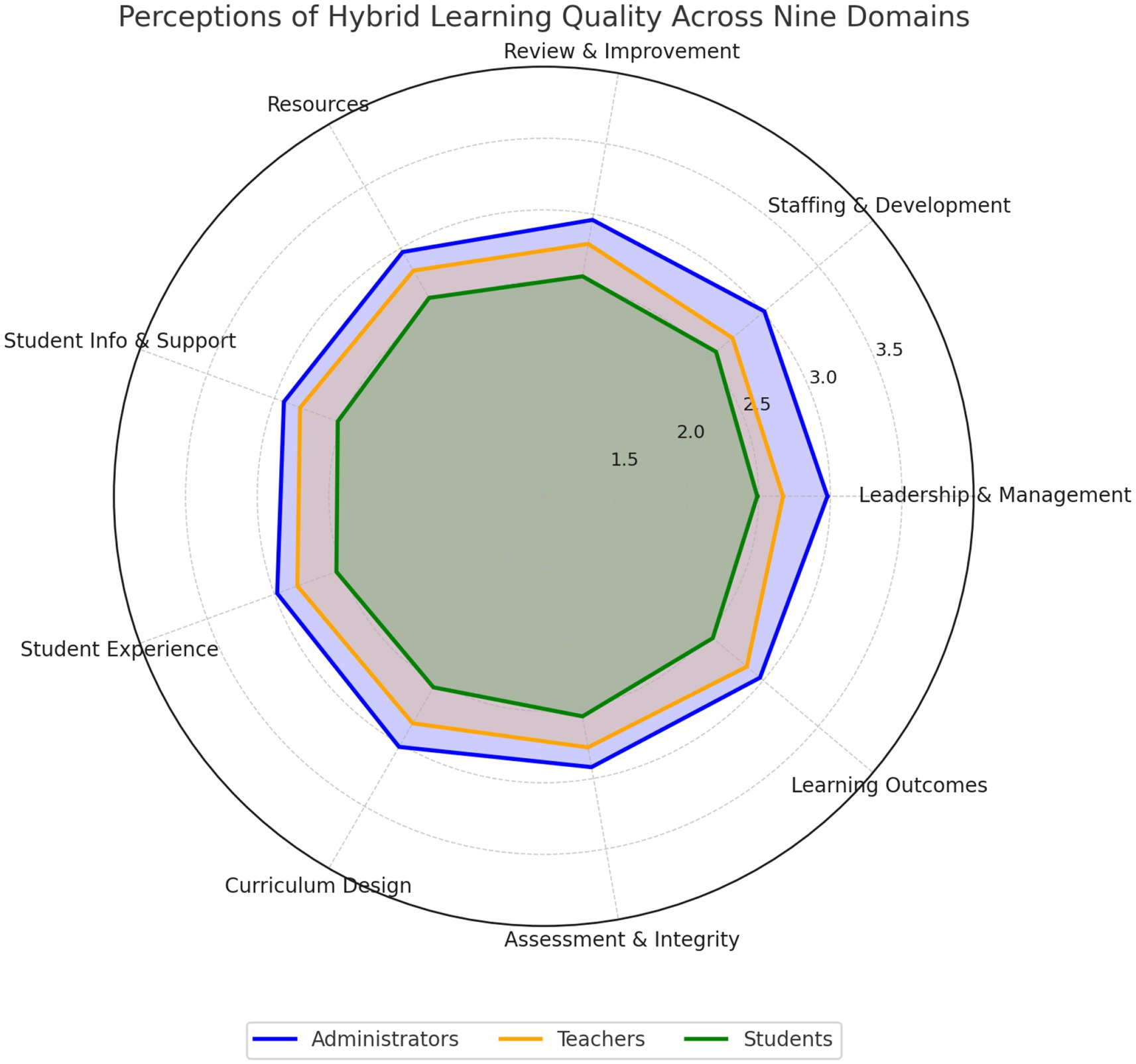
Figure 3. Radar chart of the weighted means for the perceived quality of hybrid learning across nine domains among administrators, teachers, and students.
 Huang Yalan
Huang Yalan Dave E. Marcial
Dave E. Marcial